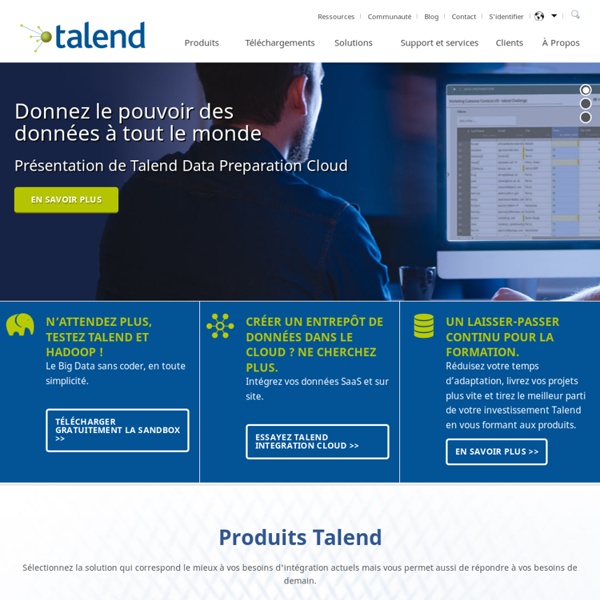



The Open Source Community How to - Digital Factory DEMO Pack (Enterprise Distribution) The Digital Factory Demo Pack is the best way to get our beautiful ACME Space DEMO without any application / database installation. Discover the beautiful authoring interface of Digital Factory. As a production like installation, the Jahia Studio is not available on this package setup. To install the Digital Factory DEMO Pack: Bossie Awards 2010: The best open source software of the year It is now roughly 40-plus years since Richard Stallman released his text editor with the words "Emacs General Public License" in the documentation and 20 some years since the world first saw the phrase "GNU General Public License." Back in those days, finding the best open source software was relatively simple. There was Emacs, and then came vi.
IBM Integrate all types of data on distributed and mainframe platforms IBM® InfoSphere® DataStage® integrates data across multiple systems using a high performance parallel framework, and it supports extended metadata management and enterprise connectivity. The scalable platform provides more flexible integration of all types of data, including big data at rest (Hadoop-based) or in motion (stream-based), on distributed and mainframe platforms. InfoSphere DataStage provides these features and benefits: DokuWiki] DokuWiki is a simple to use and highly versatile Open Source wiki software that doesn't require a database. It is loved by users for its clean and readable syntax. The ease of maintenance, backup and integration makes it an administrator's favorite. Built in access controls and authentication connectors make DokuWiki especially useful in the enterprise context and the large number of plugins contributed by its vibrant community allow for a broad range of use cases beyond a traditional wiki.
High Performance And Smarter Logging 1. Summary Logging, often a back-burner activity in the development cycle can actually be the very lifeline of the development team once the application is in production. Assuming that readers are well acquainted with various logging frameworks like Log4J, SLF4J, etc, this article lays guidelines for 'real-world' production logging, examines its influence on the application quality attributes and also rediscovers a forgotten high performance, smarter logging technique with codes and centralized logging. 2 Introduction Logging is often relegated to a back-burner activity while architecting, designing and developing applications or even when enhancing applications.
Wiki CMS Groupware The Tiki Community is proud to announce the release of , the latest version of Tiki Wiki CMS Groupware. This release, with more than 1,000 code contributions by dozens of Tiki Community members, includes many new features, some architectural enhancements, and many bug fixes. Some of these new features include: Improved batch actions based on a URL with a token access. Extensive improvements to the Maps, Slideshow, Calendar, File Gallery and Drawings New plugins and modules
Logback Console Plugin for Eclipse Logback-beagle: an Eclipse plug-in for viewing logs During the development process, it is common for developers to print logging events on the console. Typically, the developer will also customize the format of the log output by setting an appropriate layout pattern. Logback-beagle is intended as a replacement for viewing logs via the console. It offers several advantages over the plain-old console: Events of level WARN and ERROR are marked by an orange flag and respectively a red flag. Google Guava – Futures This post is a continuation of my series on Google Guava, this time covering Futures. The Futures class is a collection of static utility methods for working with the Future/ListenableFuture interface. A Future is a handle to an asynchronous task, either a Runnable or Callable, that was submitted to an ExecutorService. The Future interface provides methods for: getting the results of a task, checking if a task is done, or canceling a task. The ListenableFuture interface extends the Future interface and adds the ability to set a completion listener to run once a task is finished. To create a ListenableFuture you first need to decorate an ExecutorService instance like so: